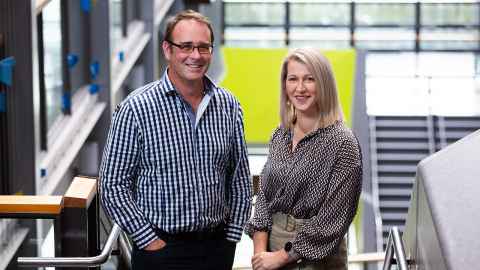Using both genetic and mathematical modelling to understand lung disease
29 June 2021
Researchers at the University of Auckland are pioneering a new approach to the understanding of Chronic Obstructive Pulmonary Disease (COPD), combining world-leading research into genetic modelling of the disease with mathematical modelling of lung structure-function.

COPD is the term used for a group of lung conditions that cause breathing difficulties, including emphysema which is the result of damage to the air sacs in the lungs, and chronic bronchitis, the long-term inflammation of the airways.
COPD can make normal activities difficult. It typically gets worse over time, and is a leading cause of death for New Zealanders, with Māori and Pacific people being disproportionately affected.
The research is being led by Professors Merryn Tawhai and Justin O’Sullivan, who are respectively the deputy directors of the Auckland Bioengineering Institute (ABI) and the Liggins Institute.
Support from the Dines Family Foundation has enabled them to combine Dr O’Sullivan’s expertise in the genetic analysis of the formation of and susceptibility to COPD, with Dr Tawhai’s research into quantitative analysis and computational modelling of normal and COPD lungs.
Most cases of COPD are caused by smoking, yet some individuals are more susceptible to the disease than others, and some people are more responsive to different treatments than others. Dr Tawhai says “we do expect that over the next ten or 20 years that smoking-related COPD might start to decline in some countries, in line with the reduction in smoking. But now we have vaping, and it’s quite possible that a person who is a lifetime vaper will develop something that is very similar to COPD.
We’re potentially creating a new COPD epidemic.
Kids who might not have smoked are vaping, and vaping more than they might have smoked, because they think there’s nothing wrong with it.
“We know vaping causes inflammation, and we know that’s bad. We’re potentially creating a new COPD epidemic. Kids who might not have smoked are vaping, and vaping more than they might have smoked, because they think there’s nothing wrong with it.”
Drs Tawhai and O’Sullivan aim to develop an approach that will help identify how both disease and treatment affects people at a personalised level. “Everyone has their own genetic profile, and the way they respond to disease such as COPD is different,” says Dr O’Sullivan.
While numerous studies have investigated the genetic basis of COPD and why some people respond better to treatment than others, this collaboration will allow the team to revisit earlier studies, combining genetic modelling with mathematical modelling, to advance understanding of individual patient differences.
It will involve investigating the disease at myriad scales and levels, including DNA sequence, the way the DNA folds, the cells involved, the way the cells interact in the tissue, the proteins in those cells, the distribution of tissue damage within the lung, and more.
“So this will help us predict the trajectory of the disease at a very personalised and individualised level,” says Dr Tawhai.
She notes that people know they shouldn’t smoke, but don’t always follow that advice. If people could be shown their personal risk of developing a disease, the impact on their lungs, the personalised trajectory of their disease, they might be more motivated to look after their health.
That is, by not smoking, or vaping. “If you can show people their personal risk profile, if they vape or smoke, then that, from a public health perspective, could make a difference. We hope that this will be one of the outcomes – that we can work out a way to refine what we do to allow for more personalised prediction. Prevention is much better than waiting for treatment.”
Margo White I Media adviser
DDI 09 923 5504
Mob 021 926 408
Email margo.white@auckland.ac.nz